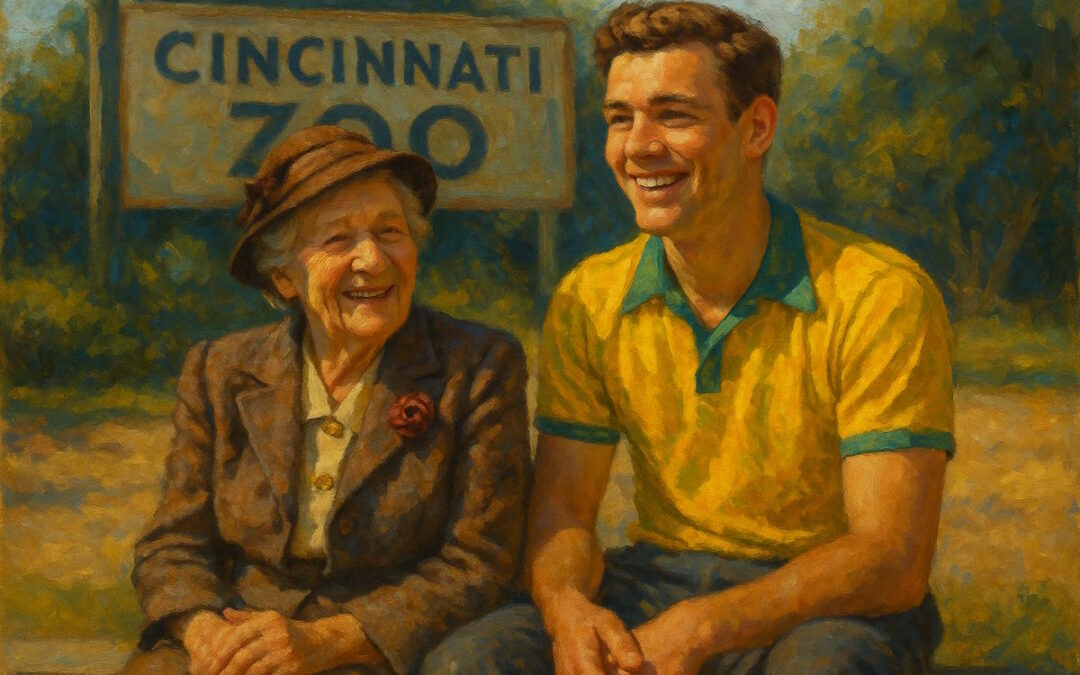Rosella had never married, and I was one of the few people in her life
“Are you there, Kevin? Are you listening?” Her voice came through the phone—high-pitched, thin, and slightly frantic.
“I’m here, Rosella. I’m listening,” I replied, a bit embarrassed, cradling the phone between my shoulder and cheek.
It was one of those long, meandering phone calls again. I had met Rosella outside church one morning. A young couple, looking flustered, had asked if I could start taking her to Mass. They had been doing it for a while but couldn’t anymore. I agreed, not realizing how this simple act would pull me into her orbit.
Rosella was a lonely old woman—never married, living alone in a creaky three-story walk-up in Cincinnati. She occupied the first floor; the upper stories were uninhabited, like the dusty shelves of a forgotten attic. Her voice was cheerful enough, often scattered with little jokes. But she spoke endlessly, rarely pausing to ask anything about me. I began the habit of setting the phone down for a few minutes at a time, just to give my ear—and my patience—a rest.
The Life She Never Had
She once told me that a man named Taylor had wanted to marry her. His wife had died, and he had children. But Rosella didn’t want what she called a “tailor-made” marriage. She chuckled at her own pun. At the time, it sounded clever. But I realized later it meant she had no one—no husband, no children—to care for her now.
I never found out her age. I even asked her one time. But like a proper lady, she declined to answer. I figured she must have been in her mid-seventies to age eighty.
The first time I visited her house, I didn’t know what a hoarder was. I found out soon enough. Every flat surface was buried under towers of papers, boxes, old containers—layers upon layers of life detritus, like sediment in an ancient canyon. Even the kitchen table, where we sometimes ate lunch, was half-covered in precarious stacks wrapped in yellowing newspaper. I’d place my plate down gently, hoping it wouldn’t slide off and crash to the floor.
What She Really Wanted
Church was only part of what she wanted. What she really hoped for was lunch at a restaurant afterward. Eventually, it became clear—if there was no lunch planned, she wasn’t interested in going to Mass at all.
Sometimes I brought her along to church and then ate with my single friends from the parish. People assumed she was my grandmother. She wasn’t, of course, but I let the illusion stand. One Sunday afternoon, I took her to the Cincinnati Zoo. We must have been an odd couple, but we enjoyed our time together.
I sometimes asked myself: What was I doing, a single guy in his late twenties, spending Sunday mornings driving a strange old woman to church, sitting with her in restaurants, listening to her endless stories? Shouldn’t I be living more freely—dating, traveling, hanging out with people my own age?
A Sense of Duty
But something deeper pulled at me. A sense of Christian duty, maybe. Or simply the unshakable feeling that people like Rosella shouldn’t be left behind.
She moved slowly, always with her cane, her back hunched like a branch bowed under snow. When she walked, her eyes rarely lifted from the ground. Even the smallest crack in the pavement could stop her in her tracks, as if she were calculating how to cross a canyon. I started to understand how treacherous the world becomes when you’re old and unsteady.
One time between Sundays, she fell and couldn’t get up. She crawled all over her house in vain. Somehow she got help, but the fire department had to break down her door. What a shame. I bought a set of makeshift water pipes to install as handholds in her apartment, hoping she would be able to pull herself up. She would have nothing to do with my contraption. Not long after, social workers convinced her to move into a nursing home.
Safety and Submission
That’s how I found myself in a quiet meeting room in that facility, sitting with Rosella’s nephew (who had mostly been absent), and a couple of staff members. They considered me a person of interest, since I had been helping her. I felt awkward—uncertain what to advise, not knowing how bad her condition really was or what options existed. Still, I listened, nodded, and tried to contribute what little I could.
Later, I visited her at the nursing home. I hadn’t called ahead, and the staff made me wait a long time. Eventually, someone scolded me gently—explaining they needed time to prepare her for visitors.
When I finally saw her, she was tucked into bed, a blanket drawn up to her neck like a protective shell. The room wasn’t cold, but she seemed so small, so still. The sparkle in her eyes was gone. No chuckles, no quirky jokes. Just silence. Was it medication? I sat with her for a while, said little, then left.
I don’t know what became of her. I moved away shortly after.
But I often wonder: What did my presence mean to her, if anything? Did I lighten her loneliness? Was I just a temporary distraction in the slow unraveling of her world?
And I wonder, too, how many Rosellas there are—silent, invisible, tucked into aging apartments or nursing homes, waiting for just one long conversation.

